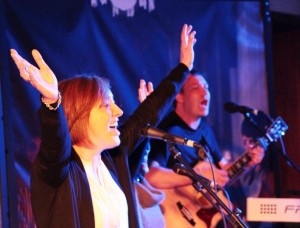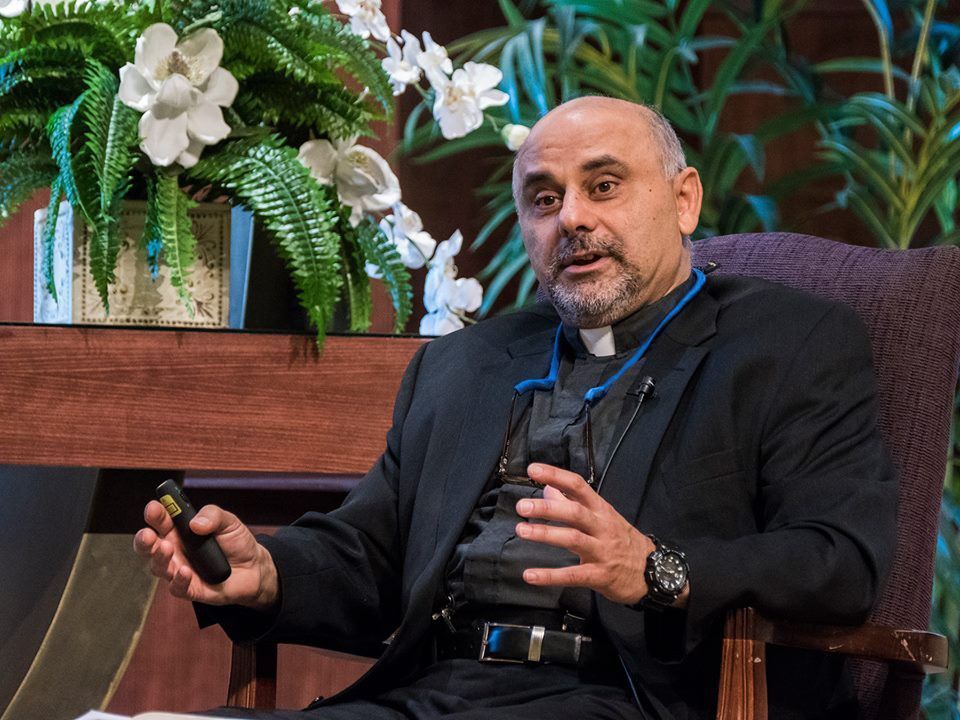 By Jeff Brumley
By Jeff Brumley
People who hop from church to church in search of more exciting worship or who seek constantly to feel the intensity of God’s presence in their lives very likely are addicts, Jeanie Miley says.
For them, religion merges with entertainment which creates a spiritual thrill that must be continually chased, said Miley, a Houston-based author and retreat leader whose expertise includes spiritual growth and wholeness.
“Our culture seems to be drawn to that which gives us a buzz or helps us to escape,” said Miley, a member of River Oaks Baptist Church, where her husband serves as pastor. “That buzz distracts from emptiness, pain or boredom.”
Christians continually striving for the feeling they experienced at a key spiritual moment, or who church-hop in search of the more inspiring preacher and worship, likely have fallen into this category, she said. The same is true for many who become fixated on the Rapture and other end-times dramas.
“Religious itself can become an addiction. You can kind of go crazy on it.”
Pursuing that ‘on-fire feeling’
Minister and writer Lucy Worley sensed something wasn’t right with her continual pursuit of spiritually intense experiences.
“For a considerable season of my life, I thought something was wrong with me because I no longer felt the way I did when I first came to the Lord,” Worley wrote recently for Relevant, a magazine of faith and culture. “That ‘on fire’ feeling I always had as a new believer was suddenly impossible to attain.”
She feared that the absence of the feelings she had as a new Christian invalidated her faith.
“I had had some initial mountaintop experiences, and I was now associating those intense emotions with a healthy relationship with God,” she wrote in her article, “Faith Isn’t All Mountaintop Moments.”
“I liked that mountain, and I didn’t want to put in the effort of climbing a new one.”
What she has since learned is that letting go of those initial peaks opens believers to even richer experiences. Not only is not having those original feelings legitimate, she said, it’s a sign of maturity.
“On the days you feel trapped between where you’ve been and where you’re going, let go of what you think your relationship with God has to look like,” Worley wrote.
‘Return journey to God’
Thousands of years of Christian contemplative practice and writing back up Worley’s conclusion, said Michael Sciretti, minister of spiritual formation at Freemason Street Baptist Church in Norfolk, Va.
There is a wealth of literature, from both Eastern and Western Christian traditions, documenting different phases of the inward spiritual journey with God. They generally include mountaintop experiences followed by lulls.
Some have described that period as “a Mount Sinai kind of experience, something that is talked about as entering a cloud of darkness where the summit is not this great emotional high,” Sciretti said. “It’s almost like a complete letting go and almost as a loss of self.”
This is also sometimes described as being enslaved in Egypt, or as a wilderness experience where “the wilderness is key to the spiritual journey,” he said.
Those who have experienced this phase often describe it as a period in which they are freed from emotions — positive or negative — and where they are neither disturbed nor elated by events that occur in their lives.
“You are free of this seesaw between pain and pleasure,” Sciretti said.
He added the state is described in Scripture, too, including Psalm 131 in which the writer prays that he has “calmed and quieted myself.”
But one needn’t be a psalmist, ascetic or mystic to experience these stages of the spiritual life, he said.
“The essence of these teachings is meant for everybody, it’s our birthright and it’s not rocket science.”
One way to be taken through these phases is to be attentive during the liturgy, he said. The same is true for following the Christian year, which can transform a remembrance of Jesus’ life into a spiritual journey and awakening.
“I think it’s hard-wired into us to go deeper,” Sciretti said. “We are all on this return journey to God.”
‘God does come and get us’
Miley notes that the non-mountaintop periods in a Christian’s life give them time to process their experiences and to remain open to where God is calling them next.
“God does come and get us through our questions and even through our doubts,” she said.
These “flat land” periods also serve as reminders that the spiritual life is one meant for living in society, with all the responsibilities that come with family and jobs, she said.
“The point of the contemplative life is not to withdraw from life, but to lead me further into life and into further engagement with people.” BP News





















